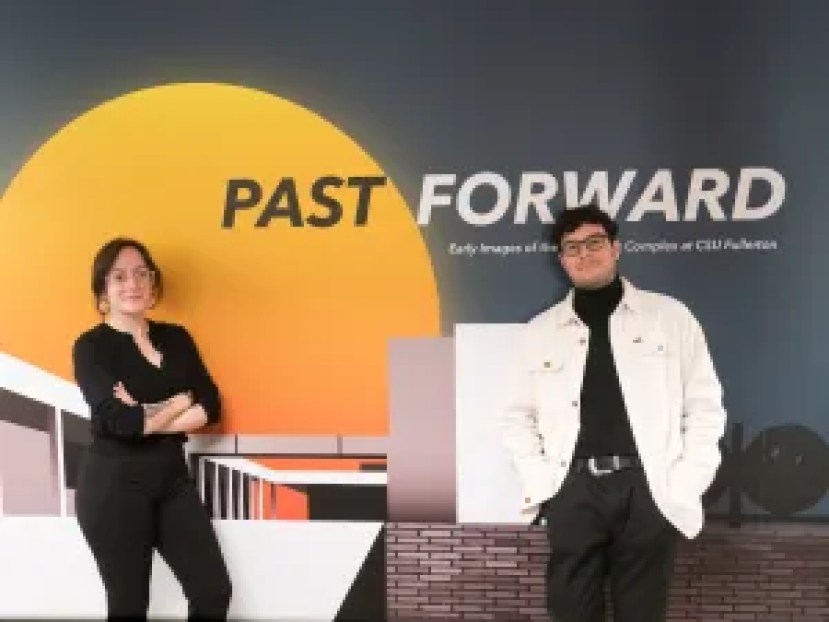
Photo of Marie-Andrée Chinchilla and Enrique Del Rivero, curators of PAST FORWARD: Early Images of the Visual Arts Complex at CSU Fullerton.
Because a large portion of Cal State Fullerton’s College of the Arts was and still is under construction, Marie-Andrée Chinchilla and Enrique Del Rivero, curatorial assistants at CSUF’s Nicholas & Lee Begovich Gallery, were curious to learn more about the midcentury modern buildings that were being demolished and wanted to pay homage to the architecture itself.
Working as part of a team for about six months, they researched the history of the university’s visual arts complex, investigating historic photographs, videos, and layout plans at the university’s library and outside institutions in order to design, install, and curate the exhibition, PAST FORWARD: Early Images of the Visual Arts Complex at CSU Fullerton, which is located on the 3rd floor of the CSUF College Park building at 2600 Nutwood Avenue in the College of the Arts – Office of the Dean.
“Looking at the campus itself, there’s a very Sixties aesthetic to the architecture of all the buildings,” said Del Rivero. “The research process was like a treasure hunt. It involved talking to faculty and staff, just trying to get to know the school better and where things were before compared to now. With the archive department at the Pollak Library, it was great; the archivists were really happy to work with us. We worked together to look through boxes of untouched files and tons of film pictures, trying to find anything that connects or that could tell us more about everything that’s gone on here.”
“It was definitely a labor of love,” added Chinchilla. “The archivists were super helpful. Since not everything has been digitized, there are tons of boxes of files that haven’t been touched in decades. We would go through hundreds of files and scan everything. Then, we would look at each individual piece and zoom into all of it, and look at every detail we could find. That’s how the main process kind of started because it was initially going to be sort of a chronological, linear story. Because of the files we were looking at, we found a copy of a black-and-white architectural rendering in our university’s archive: an 8×10 copy of it on a regular sheet of paper.”
On the computer, Chinchilla zoomed in on the building rendering and found the architect’s name: Thornton M. Abell. Once the team was further along with their research, they discovered a connection to (the) Julius Shulman (Photography Archive) at the Getty
Research Institute. “That was a big surprise for both of us,” added Del Rivero. “That research process kind of developed this whole exhibition, and that’s what we worked off of.”
“I think that was the most interesting thing to find: a whole suite of Shulman photographs at the Getty,” said Chinchilla. “I initially thought, since this is Cal State Fullerton’s architecture, there’s probably some photos taken by student historians in the Seventies, but it was Julius Shulman, a really prominent architectural photographer in Southern California. It was a big deal, going from there, being able to show that there’s this legacy.”
It took the team of curatorial assistants months to figure out how they wanted to install the exhibit and present the material. They were initially going to have the exhibition in the Begovich Gallery’s temporary office space, a windowless room in McCarthy Hall (which Del Rivero thought needed “a comprehensive facelift”), but ended up moving the exhibit to the temporary College of the Arts Dean’s Office across Nutwood Avenue.
“This definitely took a huge chunk of our time: Enrique doing design, and then doing the actual printing of the digital files, and bringing them over and figuring out where everything was going to go in terms of installation design and preparation,” said Chinchilla. “This new space worked out really well because then we could do the actual show, then have a room showcasing the department’s Modernization Project, and showcase Enrique’s designs in the conference room.”
Inside the CSUF Begovich Gallery’s Past Forward exhibition.
Past Forward is made up of three rooms. The first room contains a wide array of black and white photographic prints visually showcasing in great detail what CSUF’s Visual Arts Complex looked like through the years. This room also features Thornton Abell’s ephemera, including his original statement for the project and architectural renderings, which were acquired from UC Santa Barbara’s Architectural and Design Collections.
A video mounted on the wall contains original voice-over audio of Abell thoroughly discussing his project on the CSUF campus. This video gave Chinchilla and Del Rivero an idea of the thought process that went into developing this area of the campus.
Another room looks to the future and features artifacts from the ground-breaking of the campus’ construction along with an interactive, full-scale model of the Visual Arts Modernization Project. A device pinpoints different buildings and prominently projects the interior designs of each building onto one wall within the room. The conference room features Del Rivero’s designs and a few more images from the past.
Open until March 22nd and organized by CSUF’s Begovich Gallery, PAST FORWARD reflects on the enduring legacy of the University’s architectural and design blueprint and its possibilities for the future. An appointment is required to view the exhibition.
Visiting hours are between the hours of 10 am and 4 pm by appointment only. For an appointment, please contact jfrias@fullerton.edu. It’s important to note that your visit request is not complete until you receive email confirmation from the gallery staff. Please visit arts.fullerton.edu/begovichgallery for further information.